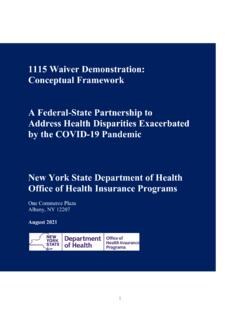Transcription of Medicaid Managed Care: Strategies to Address Social ...
1 Medicaid Managed Care: Strategies to Address Social determinants of Health & Health EquityPrepared byDECEMBER | MMC: Strategies TO Address Social determinants OF HEALTH & HEALTH EQUITYE xecutive SummarySocial factors such as income, education, food, housing and employment commonly referred to as the Social determinants of health (SDOH) are key drivers of health outcomes. Challenges in meeting Social and economic needs can lead to poor health outcomes, driving up health care costs and contributing to disparities. Given this impact, Medicaid programs are increasingly focused on addressing SDOH and health equity.
2 Health equity is when everyone has the opportunity to be as healthy as possible1 and efforts are undertaken to remove Social and economic barriers to health. Broader flexibility exists under Managed care versus fee-for-service (FFS) to Address these issues; additionally, Managed care provides the benefit of a single entity responsible for centralized care coordination. States can encourage or require Managed care organizations (MCOs) to Address SDOH and health equity via contract requirements. To understand how states are addressing SDOH through MCO contracts we reviewed 10 recent requests for proposals (RFP) which revealed an overarching commitment by states to Address SDOH and health equity through their contracting arrangements.
3 Key themes identified among reviewed RFPs are highlighted below. SDOH Requirements Many states are requiring MCOs or provider networks to screen enrollees for SDOH needs. Some are requiring provider reimbursement for these screenings. Others are requiring MCOs to leverage technology through closed-loop referral and predictive analytics. States are increasingly requiring MCO care management programs to incorporate SDOH. Recent RFPs have included requirements for MCOs to incorporate SDOH in their quality assessment and performance improvement (QAPI) programs.
4 States are increasingly requiring MCOs to coordinate with community-based organizations and ensure referrals to Social services and supports. Recent RFPs have included requirements for MCO staff to Address SDOH and for MCOs to provide training on SDOH to their Equity Requirements Recent RFPs require MCO staffing to Address health equity, as well as staff and provider training to Address racial and ethnic disparities, diversity and inclusion. States are requiring MCOs to develop cultural competency plans and to ensure culturally competent care management, marketing and MCO workforce.
5 A few states have incorporated health equity principles into their MCO pay-for-performance initiatives. Others are prioritizing health equity in the value-based payment arrangements MCOs implement with their provider networks. 3 | MMC: Strategies TO Address Social determinants OF HEALTH & HEALTH EQUITYS ocial factors such as income, education, food, housing and employment are key drivers of health outcomes. This is commonly referred to as SDOH. Research indicates up to 40 percent of health outcomes may be attributed to Social and economic In turn, challenges in meeting Social and economic needs can lead to poor health outcomes, driving up health care costs and contributing to disparities.
6 State Medicaid agencies are increasingly focused on addressing SDOH and implementing initiatives to Address health equity. This is in recognition of the importance of addressing Social and economic drivers of health to provide whole-person, patient-centered care and improve health outcomes. Such activities have been supported at the federal level. For example, in January 2021, the Centers for Medicare and Medicaid Services (CMS) released State Health Official Letter #21-001 outlining available opportunities to Address SDOH within the Medicaid This guidance summarized opportunities previously available to states and did not provide new flexibilities.
7 Prior to release of this guidance, many states were already actively implementing SDOH and health equity initiatives. The COVID-19 pandemic exacerbated health inequities, spurring further activity among states and CMS to Address SDOH and reduce disparities in This paper provides an overview of Medicaid initiatives to Address SDOH and health equity, with a focused review of recent requirements outlined in 10 MCO RFPs released in 2020 and , 6 While opportunities exist to Address SDOH and health equity across Medicaid delivery system arrangements, broader flexibility exists under Managed care versus FFS such as: Value Added Services.
8 MCOs are not limited to covering medical benefits authorized under the state plan as in FFS. Managed care provides flexibility to offer additional services. In Lieu Of Services: MCOs may also cover services or settings that are in lieu of those covered under the Medicaid state plan. FFS arrangements do not offer such flexibility. Reinvesting Savings: States may utilize savings attributable to Managed care to provide additional Incentivizing Outcomes: States can develop MCO reimbursement Strategies such as performance withholds or bonuses with payments earned based on outcomes.
9 Such arrangements create incentives for MCOs to adopt Strategies addressing SDOH and equity. Contracting Flexibilities: States have significant flexibility in developing MCO contract requirements to prioritize SDOH and health equity. In addition to the additional flexibilities available under Managed care, FFS programs lack the benefit of a single entity responsible for overall patient care coordination. MCOs provide the benefit of centralized coordination of identification of need, referral and Managed Care Opportunities to Address SDOH & Health Equity4 | MMC: Strategies TO Address Social determinants OF HEALTH & HEALTH EQUITYS tates can encourage or require MCOs to provide services to Address SDOH and health equity by including requirements in Medicaid Managed care procurements.
10 The majority of states report utilizing MCO contracts as a vehicle for addressing these important issues. 33 Medicaid Managed care states indicated they had MCO contract requirements in place during state fiscal year (SFY) 2021 to Address SDOH. An additional 18 indicated plans to incorporate requirements in SFY 2022. Further, half of states responding to the 50-State Medicaid Budget Survey, conducted by Health Management Associates and the Kaiser Family Foundation, reported MCO requirements or initiatives to Address health determinants of HealthAs outlined in the sections below, recent MCO RFPs reflect a broad commitment by states to Address SDOH through their contracting arrangements.





